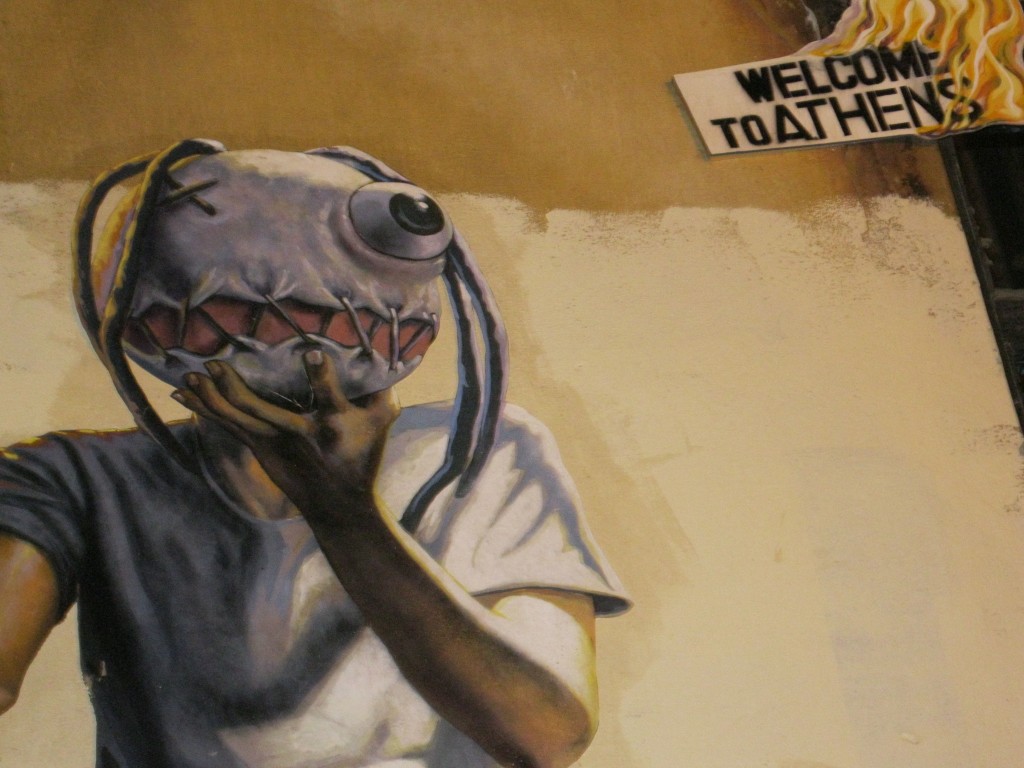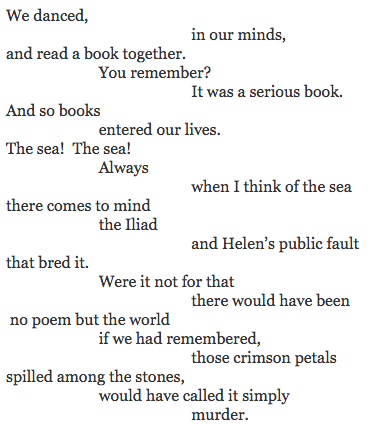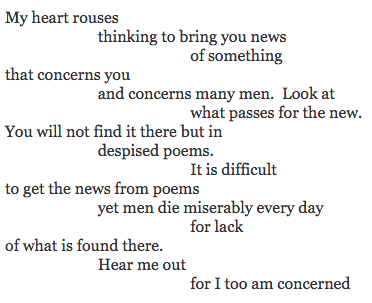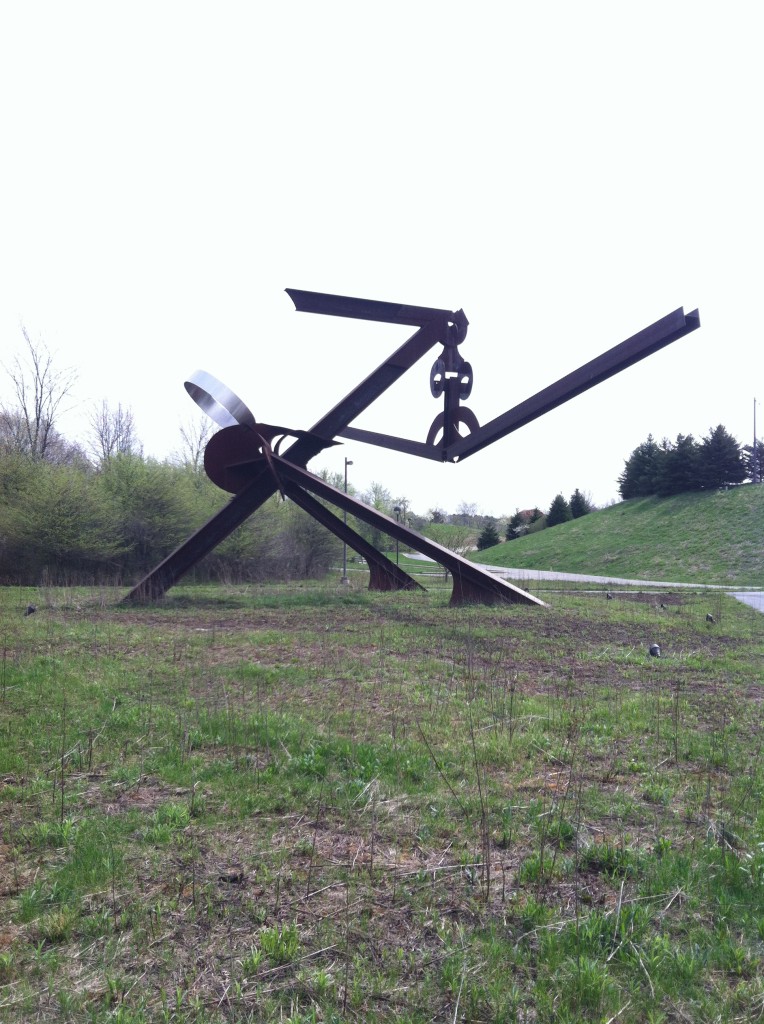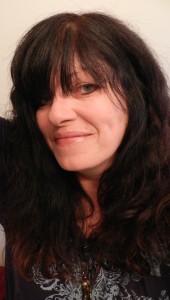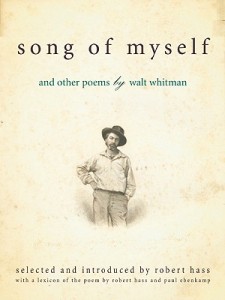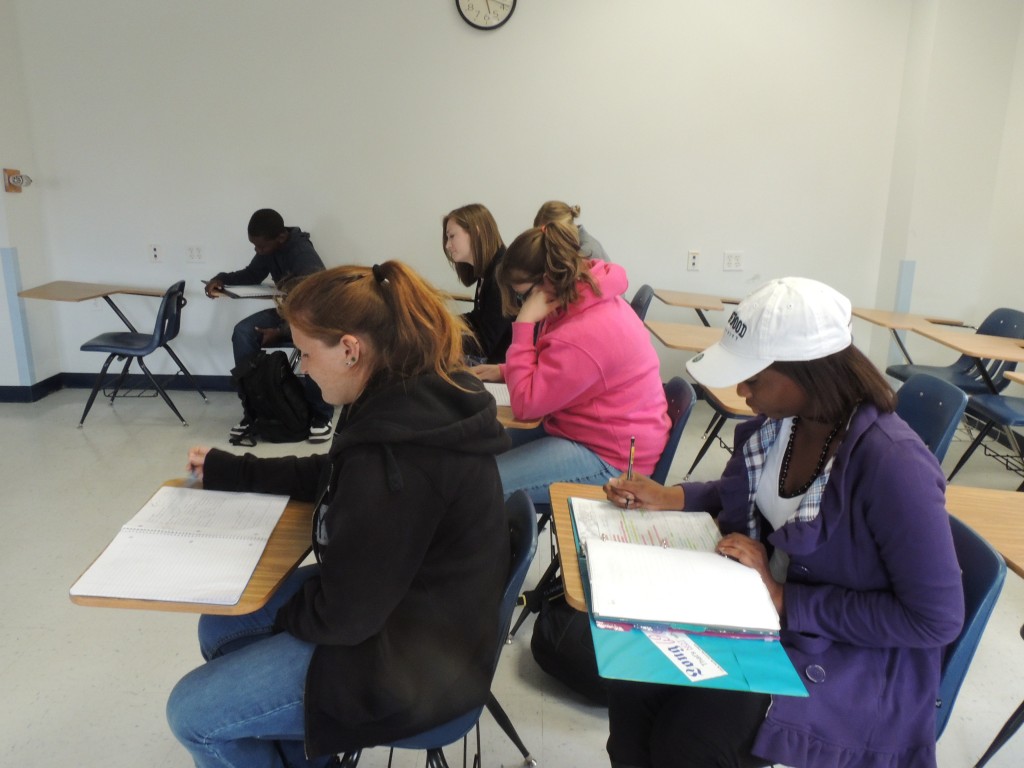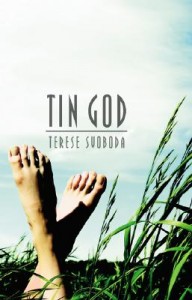 Poets, like anyone else, have always had a real life in the real world. Unless they were Homer retelling a traditional story, they have always begun from somewhere within their own experience. (And who knows why Homer chose to tell that particular story?) The focus of most poets, however, has not always been as narrow as it seems to be today.
Poets, like anyone else, have always had a real life in the real world. Unless they were Homer retelling a traditional story, they have always begun from somewhere within their own experience. (And who knows why Homer chose to tell that particular story?) The focus of most poets, however, has not always been as narrow as it seems to be today.
Ever since Robert Lowell, Ann Sexton and others moved American poetry into the “confessional” mode, our national poetic dialog has become a litany of self-centered anecdotes and monologues: “here’s what I saw” or “such-and-such happened to me.”
Well, speaking of being self-centered, I personally am sick and tired of those often rather limited poems. They remind me of my “friends” who post regularly on Facebook what they ate for breakfast and how many miles they ran.
That’s why I am teaching a new poetry workshop – to prod participants toward some fresher or deeper perspective on their own experience. This workshop is called Child, Shaman, Sage: Widening the I (Eye) of the Poem, and I am proposing three possible directions in which participants might develop their personal poems.
1. One direction is to take on the child’s point of view. Drop the adult knowledge and open the poem to the naive sensorium and limited experience of the young.
2. Another direction is toward magic. Take on the fluid and shape-shifting powers of the shaman.
3. And the third direction is, of course, the sage who can consider the whole world beyond the personal. The sage can help the writer ask, “Where does my little story fit in the wider universe?
Let’s explore some poems whose authors have used these various strategies.
William Carlos Williams is notorious for the faux-naïveté of “This is just to say…”
This is just to say
I have eaten
the plums
that were in
the icebox
and which
you were probably
saving
for breakfast
Forgive me
they were delicious
so sweet
and so cold
While the poem isn’t written to his mother, it’s still a sort of “hey, Ma, I didn’t mean to do it.” And here is another WCW poem which depends on that uncluttered vision of the child:
The Great Figure
Among the rain
and lights
I saw the figure 5
in gold
on a red firetruck
moving
tense
unheeded
to gong clangs
siren howls
and wheels rumbling
through the dark city.
To appreciate this little son et lumière show, we need to go back to being about five years old, still excited about having learned our numbers, and extra thrilled that this number is on a fire truck and we can read it. Plus there’s the excitement of being out so
late at night, after it’s already dark. Only this point of view allows us to fully appreciate the big wow.
Another familiar poem, “in just” by e.e. cummings, flirts with the world of the child.
Remember how
eddieandbill come
running from marbles and
piracies and it’s
spring
…
and bettyandisbel come dancing
from hop-scotch and jump-rope and
it’s spring
and we’re perfectly happy to believe in the goat-footed little lame balloon man? Here cummings yanks us back to when we used to run our friends’ names together in a verbal blur. And then he adds the magic balloon man. But more about magic in a little bit. For now, let’s look at the most adult and philosophical of poets, Wallace Stevens, who in section XI of “Thirteen Ways of Looking at a Blackbird” evokes the tale of Cinderella:
He rode over Connecticut
In a glass coach…
Although the child’s fairytale reference comes up only briefly, it adds to Stevens’ multi-dimensional look at multi-dimensionality.
Our final “child” in this discussion is John Ashbery who has always liked to play with words and ideas. His poem “What Is Written” follows a runaway train of thought worthy of the young. What happens when a bird steals a spool of thread?
Why is that bird ignoring us,
pausing in mid-flight to take another direction?
Is it a feeling of guilt about the spool
it dropped on the bank of a stream
into which it eventually rolled? Dark spool,
moving oceanward now – what other fate could have been yours?
You could have lived in a drawer
for many years, imprisoned, a ward of the state. Now you are free
to call the shots pretty much as they come.
Poor, bald thing.
Ashbery’s ability to speak to a spool and imagine its life in a drawer makes a good transition into my second route to enlarging poems, the technique I’m calling shamanic magic. I’m not talking about South American magic realism, but about the ability to leap boundaries into the impossible – and surely it’s coincidence rather than magic that two of my three examples are named Hughes. One of them, Langston Hughes, in “The Negro Speaks of Rivers,” claims the ability to have lived in multiple times and places:
I’ve known rivers:
I’ve known rivers ancient as the world and older than the flow of human blood in human veins.
I bathed in the Euphrates when dawns were young.
I build my hut near the Congo and it lulled me to sleep.
I looked upon the Nile and raised the pyramids above it.
I heard the singing of the Mississippi when Abe Lincoln went down to New Orleans,
and I’ve seen its muddy bosom turn all golden in the sunset.
Before humans even existed, the speaker knew rivers, and he has lived through the earliest civilizations into the history of the United States. It is by these powerful experiences that he can claim, “My soul has grown deep like the rivers.”
As Langston Hughes crosses time barriers, Ted Hughes is known for crossing the barriers of species. Instead of looking at crows, let’s look at a semi-human figure, the traditional wild man of the woods, or, as Hughes uses the old word, the “Wodwo.”
What am I? Nosing here, turning leaves over
Following a faint stain on the air to the river’s edge
I enter water…
…Why do I find
this frog so interesting as I inspect its most secret
interior and make it my own?
…
But what shall I be called am I the first
have I an owner what shape am I what
shape am I am I huge if I go
to the end on this way past these trees and past these trees
till I get tired that’s touching one wall of me
for the moment if I sit still how everything
stops to watch me I suppose I am the exact centre
but there’s all this what is it roots
roots roots roots and here’s the water
again very queer but I’ll go on looking
When I first read this poem, not knowing what a wodwo was, I thought Hughes might be transforming himself into a dog. His act of imagination becomes bigger when he is that less familiar creature. (Does being a wild man explain the non-standard punctuation?).
We find another kind of magic in “Hymn” by contemporary Oregon poet Ed Skoog:
My brother is pulling
down the shade
of his detective agency’s
office window. My
brother is locking
the deer in the zoo.
…
My brother
searches his armor
for the golden key.
My brother steps inside
his apartment hidden
in a portside alley
just as a tank rolls by.
Tanks are quieter
than you’d think.
I have so many
brothers, I don’t
know who isn’t
among their numbers.
Every man and woman
who has repaired
a shoe is my brother.
…Everything
that has apparition
above ground is
my brother. Invis-
ibility is also.
I have omitted several of Skoog’s made-up brothers and also the figurative sisters, but with or without them, you can see this is not a factual poem. In all these poems of impossibility, the world becomes richer and more amazing than it was before we knew the poems.
Finally we come to the sage who offers us the larger context of experience as well as the experience of a larger context.
Consider this tiny poem by little-known poet named Chase Fire. (Isn’t that a wonderful name?)
The Depth of the Galaxy
night fishing
in a starlit creek…
the depth of the galaxy
around my ankles
A similar manipulation of context is used by Edward Hirsch in “The Widening Sky”:
I am so small walking on the beach
at night under the widening sky.
…
I am disappearing so far into the dark
I have vanished from sight.
I am a tiny seashell
that has secretly drifted ashore
and carries the sound of the ocean
surging through its body.
I am so small now no one can see me.
How can I be filled with such a vast love?
Just as these poets play with size, a “sage” poet can also play with time. That’s what
A.E. Housman does in “On Wenlock Edge the wood’s in trouble” where he thinks back to a Roman soldier standing cold guard in Britain.
Through him the gale of life blew high;
The tree of man was never quiet:
Then ‘twas the Roman, now ‘tis I.
The gale, it plies the saplings double,
It blows so hard, ‘twill soon be gone:
To-day the Roman and his trouble
Are ashes under Uricon.
And then there are some amazing pieces like “Leda and the Swan” by William Butler Yeats where the poet is the child, the shaman, and the sage all at once.
“Her thighs caressed/By the dark webs” is the young girl simply seeing what is and not knowing enough to call it rape; “her nape caught in his bill” is the transformation to birdhood; and then come the amazing consequences only a sage could see and write:
A shudder in the loins engenders there
The broken wall, the burning roof and tower
And Agamemnon dead.
We know that Zeus’ orgasm will change the world. Leda will be the mother of both Helen and later Clytemnestra, that Helen will cause the Trojan War, the breaching of the great walls, the final burning of the city. We know Clytemnestra will kill Agamemnon when he finally comes home from Troy. We know that nothing is without consequences.
Needless to say, most of these poems I have quoted would be tough models for anyone but I hope that as my workshop participants revise they can try exploring the concept “child, shaman, sage.” May they find inspiration to stretch their own work beyond the simple report “this personal thing happened to me and here’s how it made me feel.” The English language and the human mind are wider than a Facebook posting.
 My first full-length collection Submerged (forthcoming, ELJ Editions, 2018), came about from a nasty case of writers block and meeting the right reader at the right time. Of course I had the urge to write, I just had nothing to write about. I would sit at my computer and think of nothing. For hours and days. Everyone runs into this, but I didn’t expect my writers block to turn into something publishable, let alone a book, to say nothing of a book about a single, unified idea: the coming water.
My first full-length collection Submerged (forthcoming, ELJ Editions, 2018), came about from a nasty case of writers block and meeting the right reader at the right time. Of course I had the urge to write, I just had nothing to write about. I would sit at my computer and think of nothing. For hours and days. Everyone runs into this, but I didn’t expect my writers block to turn into something publishable, let alone a book, to say nothing of a book about a single, unified idea: the coming water.